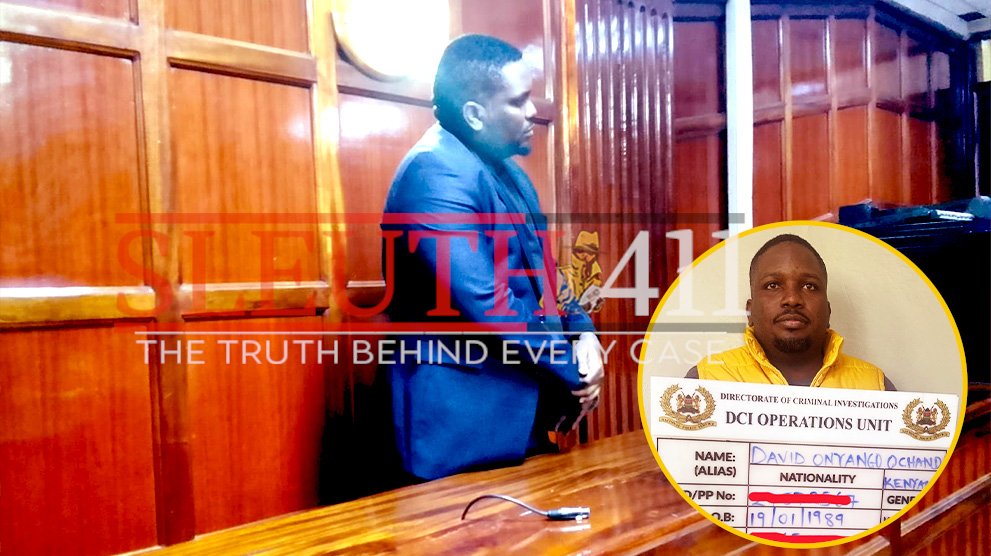One of the most recent and high-profile cases involves David Onyango Ochanda in the Sh223 Million Gold Fraud Case, charged in Nairobi.
Authorities allege that Ochanda defrauded an American investor, Tanner Caldwell Cook, of over USD 1,271,200.74 (approximately Sh223,756,000). The fraud was under the pretense of supplying 2,820 kilograms of gold. This case highlights just how organised and daring gold scam cartels have become in Kenya.
The sheer size of the transaction, the carefully planned deception, and the high-profile courtroom drama surrounding Ochanda’s arraignment have made this case a focal point. It is central to the ongoing battle against financial crimes in the country.
To understand the magnitude of the case, one must first look at who David Onyango Ochanda is. He has been on law enforcement’s radar for years. Often, he is linked to Nairobi’s shadowy gold fraud networks. His name has surfaced multiple times in scams where international investors were lured with promises of lucrative gold deals, only to end up losing millions.

In the current case, David Onyango Ochanda, in the Sh223 million gold fraud case, prosecutors allege that he played a central role. He was the mastermind who convinced the victim that he had access to tonnes of gold ready for export.
His modus operandi follows a familiar pattern seen in previous scams: elaborate setups, falsified documents, and a team of accomplices. These elements worked together to create the illusion of legitimacy. This reputation makes him not just a suspect but a recurring figure in Kenya’s growing list of high-profile financial fraudsters.
The victim, Tanner Caldwell Cook, was allegedly duped into believing he was entering a legitimate business transaction. Ochanda and his accomplices convinced him between March 31 and May 30, 2024. Cook was persuaded to part with over Sh223 million in exchange for 2,820 kilograms of gold that never existed.
In court documents, Ochanda is accused of obtaining money by pretenses and conspiring with others already facing charges. The scam was structured to look like a real deal, complete with staged negotiations and fabricated assurances. These plans ensured that the gold consignment would be delivered.
The significance of David Onyango Ochanda in the Sh223 million gold fraud case lies not only in the amount involved but also in how smoothly the con was executed. It shows the lengths fraudsters are willing to go to convince investors of their legitimacy. This, even when there is no actual gold to deliver.
How the Fraud Was Executed
The Sh223 million scam was not a haphazard operation; it was a meticulously planned heist that unfolded over two months. Investigators believe that Ochanda and his associates used pretences to win Cook’s trust.
They promised access to 2,820 kilograms of gold, valued at millions of dollars.
They staged meetings and discussions that mimicked authentic business negotiations.
They created an illusion of credibility by introducing documents and agreements that appeared binding.

In reality, no gold existed. The objective was simple: extract the funds and disappear. The fact that Ochanda acted jointly with others already before the court underscores that this was a coordinated syndicate operation rather than a solo fraud.
This method of operation is part of why gold scams in Kenya have become so dangerous; they look professional, they use real corporate structures, and they prey on the investor’s belief in Kenya as a gold hub.
Court Proceedings Against David Onyango Ochanda
At his arraignment, David Onyango Ochanda, in the Sh223 million gold fraud case, appeared before Senior Principal Magistrate Dolphina Alego. He was formally accused of obtaining USD 1,271,200.74 from Tanner Caldwell Cook. The accusation was based on his pretence that he could sell him gold.
When the charges were read, Ochanda denied all accusations, maintaining that he was not guilty. Despite the massive sum involved, the court granted him a cash bail of Sh400,000, a figure that sparked debate among observers who argued it was disproportionately low compared to the Sh223 million allegedly stolen.
Legal experts note that while bail is a constitutional right, the case will test the efficiency of Kenya’s judicial system in dealing with large-scale financial crimes. If convicted, Ochanda could face severe penalties, but the trial is also expected to reveal more about the networks and individuals tied to gold fraud in Nairobi.

